 W
WAitsu ni Koishite is a 1987 Japanese drama film directed by Taku Shinjō, based on the 1985 novel Uma no Gonta no Se ni Yurare Yatta ze! Nihonjūdan 2600-Kilo by Yasuhisa Shimazaki. The film is notable for the acting debut of teen singer Chisato Moritaka. Aitsu ni Koishite was released theatrically on May 30, 1987 as part of Pocari Sweat's Movie Caravan campaign.
 W
WThe Challenge is a 1982 American action film directed by John Frankenheimer and written by John Sayles, Richard Maxwell, and Marc Norman. The film stars Scott Glenn and Toshirō Mifune, and features several aikido-based action scenes choreographed by Steven Seagal, prior to the start of his own film career.
 W
WA Chaos of Flowers , also known as The Rage of Love, is a 1988 Japanese film directed by Kinji Fukasaku. The film portrays the movements of society and art in the Taishō period from the viewpoint of Akiko Yosano.
 W
WCrest of Betrayal is a 1994 Japanese film directed by Kinji Fukasaku.
 W
WThe Crucified Lovers is a 1954 Japanese film directed by Kenji Mizoguchi. It was adapted from Monzaemon Chikamatsu's 1715 bunraku play Daikyōji mukashi goyomi. The film was presented at the 1955 Cannes Film Festival,
 W
WDeath of a Tea Master is a 1989 Japanese biographical drama film directed by Kei Kumai. It is based on real life events of Sen no Rikyū, particularly the events surrounding his ritual suicide. It was entered into the main competition at the 46th Venice International Film Festival, in which it won the Silver Lion.
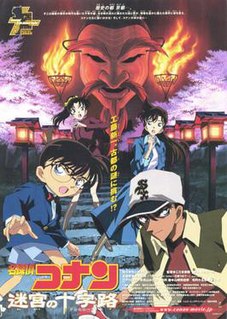 W
WDetective Conan: Crossroad in the Ancient Capital is a 2003 anime film, the seventh based on the Case Closed series, directed by Kenji Kodama.
 W
WThe End of Summer is a 1961 Japanese film directed by Yasujirō Ozu for Toho Films. It was entered into the 12th Berlin International Film Festival. The film was his penultimate; only An Autumn Afternoon (1962) followed it, which he made for Shochiku Films.
 W
WFall Guy is a 1982 Japanese film directed by Kinji Fukasaku, with art direction by Akira Takahashi. It was chosen as the Best Film at the Japan Academy Prize ceremony.
 W
WThe Fall of Ako Castle is a 1978 Japanese historical martial arts period film directed by Kinji Fukasaku. It depicts the story of the forty-seven Ronin (Chūshingura). The film is one of a series of period films by Fukasaku starring Yorozuya Kinnosuke, including Shogun's Samurai. The film received one nomination for the Award of the Japanese Academy for best cinematography.
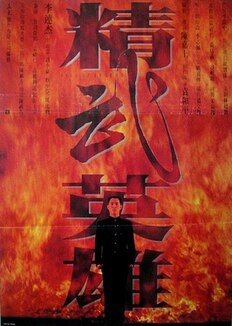 W
WFist of Legend is a 1994 Hong Kong martial arts film directed by Gordon Chan, featuring action choreography by Yuen Woo-ping, and produced by Jet Li, who also starred in the lead role. The film was released on 22 December 1994. It is a remake of the 1972 film Fist of Fury, which starred Bruce Lee as the lead character. The film is set in the Shanghai International Settlement in 1937 at the beginning of the Second World War as the Imperial Japanese Army are stationed in Shanghai, China. It holds a 100% rating on Rotten Tomatoes.
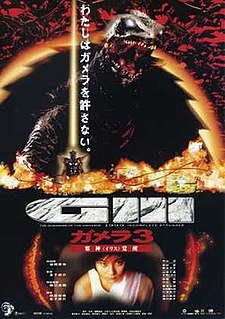 W
WGamera 3: Revenge of Iris is a 1999 Japanese kaiju film directed by Shusuke Kaneko, with special effects by Shinji Higuchi. Produced by Daiei Film and distributed by Toho, the film is the 11th entry in the Gamera film series, as well as the third film in the franchise's Heisei period, serving as a sequel to the 1996 film Gamera 2: Attack of Legion.
 W
WThe Geisha House is a 1998 film directed by Kinji Fukasaku.
 W
WA Geisha is a 1953 Japanese film directed by Kenji Mizoguchi, centred on life in post-war Gion, Kyoto, through the relationship between an established geisha, Miyoharu, and teenaged Eiko, who pleads with Miyoharu to take her on as an apprentice geisha, or maiko. The film is based on the novel by Matsutarō Kawaguchi, who also produced the screenplay.
 W
WGolgo 13: Assignment Kowloon is a 1977 Japanese–Hong Kong action film starring Sonny Chiba as the international assassin Golgo 13. It is the second live-action movie based on the manga series Golgo 13, after the eponymous 1973 Japanese–Iranian film.
 W
WHal is a 2013 Japanese animated film produced by Wit Studio and directed by Ryōtarō Makihara. It was released in Japan on June 8, 2013.
 W
WHello World , stylized as HELLO WORLD, is a 2019 Japanese animated science fiction romantic drama film directed by Tomohiko Itō from an original screenplay written by Mado Nozaki. Produced by Graphinica, the film is set in a futuristic Kyoto where a high school student named Naomi Katagaki encounters a person claiming to be himself, who time-traveled from 10 years in the future to save a classmate named Ruri Ichigyō.
 W
WThe House Where Evil Dwells is a 1982 American-Japanese horror film starring Edward Albert, Susan George and Doug McClure about an American family that moves into a reputed haunted house in the hills of Japan. It was directed by Kevin Connor and produced by Martin B. Cohen. It was based on a novel by James Hardiman and turned into a screenplay by Robert Suhosky.
 W
WKuroneko is a 1968 Japanese horror film directed by Kaneto Shindo, and an adaptation of a supernatural folktale. Set during a civil war in feudal Japan, the film's plot concerns the vengeful spirits, or onryō, of a woman and her daughter-in-law, who died at the hands of a band of samurai. It stars Kichiemon Nakamura, Nobuko Otowa, and Kiwako Taichi.
 W
WKwaidan is a 1965 Japanese anthology horror film directed by Masaki Kobayashi. It is based on stories from Lafcadio Hearn's collections of Japanese folk tales, mainly Kwaidan: Stories and Studies of Strange Things (1904), for which it is named. The film consists of four separate and unrelated stories. Kwaidan is an archaic transliteration of the term kaidan, meaning "ghost story". The film won the Special Jury Prize at the 1965 Cannes Film Festival, and received an Academy Award nomination for Best Foreign Language Film.
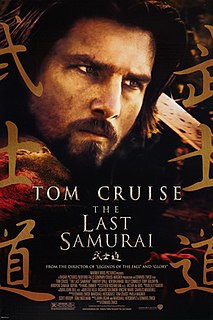 W
WThe Last Samurai is a 2003 American epic period action drama film directed and co-produced by Edward Zwick, who also co-wrote the screenplay with John Logan and Marshall Herskovitz from a story devised by Logan. The film stars Tom Cruise, who also co-produced, with Timothy Spall, Ken Watanabe, Billy Connolly, Tony Goldwyn, Hiroyuki Sanada, Koyuki, and Shin Koyamada in supporting roles.
 W
WThe Life of Oharu is a 1952 Japanese historical fiction film directed by Kenji Mizoguchi from a screenplay by Yoshikata Yoda. It stars Kinuyo Tanaka as Oharu, a one-time concubine of a daimyō who struggles to escape the stigma of having been forced into prostitution by her father.
 W
WLost in Translation is a 2003 romantic comedy-drama film written and directed by Sofia Coppola. Bill Murray stars as Bob Harris, a fading American movie star who is having a midlife crisis when he travels to Tokyo to promote Suntory whisky. There, he befriends another estranged American named Charlotte, a young woman and recent college graduate played by Scarlett Johansson. Giovanni Ribisi and Anna Faris also feature. The film explores themes of alienation and disconnection against a backdrop of cultural displacement in Japan. Further analysis by critics and scholars has focused on the film's defiance of mainstream narrative conventions and its atypical depiction of romance.
 W
WMemoirs of a Geisha is a 2005 American epic period drama film directed by Rob Marshall and adapted by Robin Swicord from the 1997 novel of the same name by Arthur Golden. It tells the story of a young Japanese girl, Chiyo Sakamoto, who is sold by her impoverished family to a geisha house to support them by training as and eventually becoming a geisha under the pseudonym "Sayuri Nitta." The film centers around the sacrifices and hardship faced by pre-World War II geisha, and the challenges posed by the war and a modernizing world to geisha society. It stars Zhang Ziyi in the lead role, with Ken Watanabe, Gong Li, Michelle Yeoh, Youki Kudoh, Suzuka Ohgo, and Samantha Futerman.
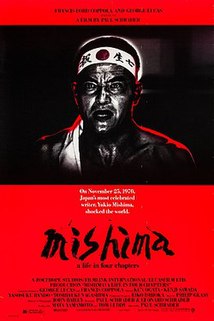 W
WMishima: A Life in Four Chapters is a 1985 American biographical drama film based on the life and work of Japanese writer Yukio Mishima, directed by Paul Schrader from a screenplay co-written with his brother Leonard. The film interweaves episodes from Mishima's life with dramatizations of segments from his books The Temple of the Golden Pavilion, Kyoko's House, and Runaway Horses. Francis Ford Coppola and George Lucas were executive producers of the film, which has a musical score composed by Philip Glass and production design by Eiko Ishioka.
 W
WNight Is Short, Walk On Girl is a 2017 Japanese animated romantic comedy film directed by Masaaki Yuasa. The film is based on the 2006 novel The Night Is Short, Walk on Girl written by Tomihiko Morimi and illustrated by Yusuke Nakamura, who also served as the film's original character designer. The film was released in North America as The Night Is Short, Walk On Girl, with a leading article added, but in other English-speaking regions without one. It has been awarded the Grand Prize for Best Animated Feature at the Ottawa International Animation Festival and the Japan Academy Prize for Animation of the Year.
 W
WNo Regrets for Our Youth is a 1946 film written and directed by Akira Kurosawa. It is based on the 1933 Takigawa incident.
 W
WQuill is a 2004 Japanese drama film about a guide dog, first released in Japan on 13 March 2004 and on DVD on 25 September 2004. It was also shown at the 2004 Toronto International Film Festival in Canada on 17 September 2004.
 W
WRashomon is a 1950 Jidaigeki psychological thriller/crime film directed by Akira Kurosawa, working in close collaboration with cinematographer Kazuo Miyagawa. Starring Toshiro Mifune, Machiko Kyō, Masayuki Mori, and Takashi Shimura as various people who describe how a samurai was murdered in a forest, the plot and characters are based upon Ryunosuke Akutagawa’s short story "In a Grove", with the title and framing story being based on "Rashōmon", another short story by Akutagawa. Every element is largely identical, from the murdered samurai speaking through a Shinto psychic to the bandit in the forest, the monk, the rape of the wife, and the dishonest retelling of the events in which everyone shows his or her ideal self by lying.
 W
WRebirth of Mothra 3 is a 1998 Japanese kaiju film directed by Okihiro Yoneda, written by Masumi Suetani, and produced by Shōgo Tomiyama. Produced and distributed by Toho Studios, it is the final film in the Rebirth of Mothra trilogy, following the previous year's Rebirth of Mothra II.
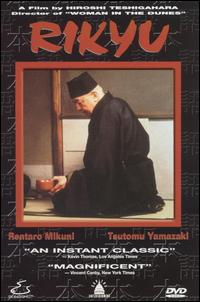 W
WRikyu is Hiroshi Teshigahara's film about the 16th century master of the Japanese tea ceremony, Sen no Rikyū. The film was adapted from the novel of Yaeko Nogami.
 W
WDuel at Ichijoji Temple is a color 1955 Japanese film directed by Hiroshi Inagaki starring Toshiro Mifune. Shot in Eastmancolor, it is the second film of Inagaki's Samurai Trilogy.
 W
WShinsengumi is a 1969 Japanese jidaigeki film.
 W
WShogun's Samurai , also known as Yagyu Clan Conspiracy and Intrigue of the Yagyu Clan, is a 1978 Japanese historical martial arts period film directed by Kinji Fukasaku. The film is the first of two period films by Fukasaku starring Shinichi "Sonny" Chiba as Jūbei Mitsuyoshi Yagyū, the other being Samurai Reincarnation. The film was adapted into a teleplay called The Yagyu Conspiracy which was broadcast by Kansai Telecasting Corporation for 39 one-hour TV episodes from 1978 to 1979. A TV movie remake starring Takaya Kamikawa as Jūbei and Hiroki Matsukata as Munenori aired on TV Asahi on September 28, 2008. A second TV movie remake starring Kōtarō Yoshida as Munenori and Junpei Mizobata as Jūbei aired on NHK BS Premium on April 11, 2020.
 W
WSisters of the Gion or Sisters of Gion is a 1936 black and white Japanese drama film directed by Kenji Mizoguchi about two geisha sisters living in Kyoto's Gion district. It forms a diptych with Mizoguchi's Osaka Elegy which shares much of the same cast and production team.
 W
WTora-san's Cherished Mother , aka Tora-san's Homeward Journey, Am I Trying? Part II, and Torasan Pt. 2, is a 1969 Japanese comedy film directed by Yoji Yamada. It stars Kiyoshi Atsumi as Kuruma Torajirō (Tora-san), and Orie Satō as his love interest or "Madonna". Tora-san's Cherished Mother is the second entry in the popular, long-running Otoko wa Tsurai yo series.
 W
WTora-san's Dream of Spring aka Torasan Dreams Springtime is a 1979 Japanese comedy film directed by Yoji Yamada. It stars Kiyoshi Atsumi as Torajirō Kuruma (Tora-san), and Kyōko Kagawa as his love interest or "Madonna". Tora-san's Dream of Spring is the twenty-fourth entry in the popular, long-running Otoko wa Tsurai yo series.
 W
WThe War of the Gargantuas is a 1966 kaiju film directed by Ishirō Honda, with special effects by Eiji Tsuburaya. Referred by scholar Stuart Galbraith IV as a "quasi–sequel" to Frankenstein Conquers the World, the film was a Japanese-American co-production; it was the third and final collaboration between Toho Co., Ltd and Henry G. Saperstein. The film stars Russ Tamblyn, Kumi Mizuno and Kenji Sahara, with Yû Sekida as Sanda and Haruo Nakajima as Gaira. In the film, scientists investigate the sudden appearance of two giant hairy humanoid monsters that culminates in a battle in Tokyo.
 W
WThe Yakuza is a 1974 neo-noir crime drama film directed by Sydney Pollack and starring Robert Mitchum, Ken Takakura and Brian Keith. The screenplay by Paul Schrader and Robert Towne is from a story by Leonard Schrader.